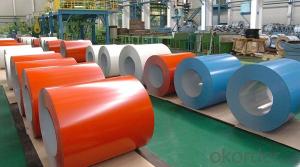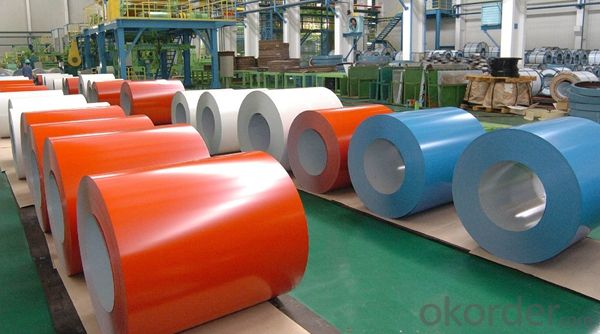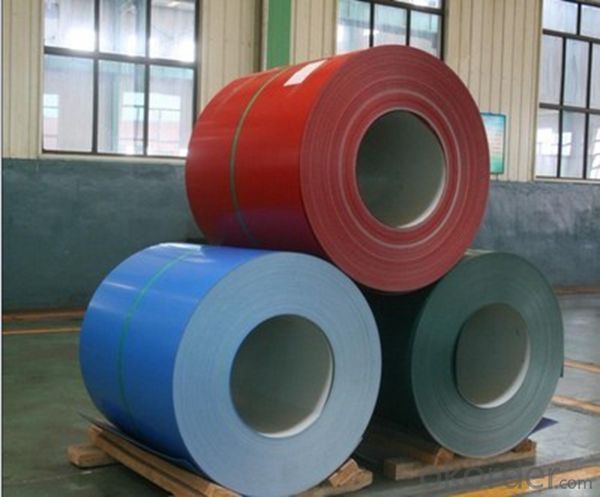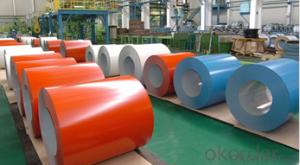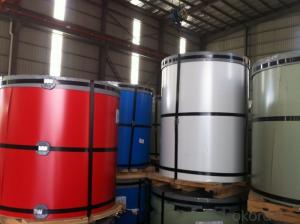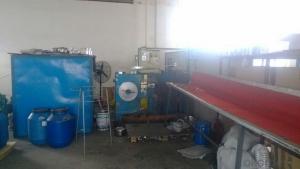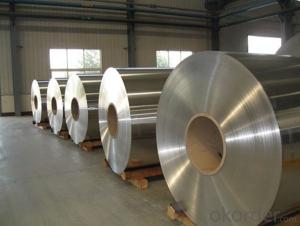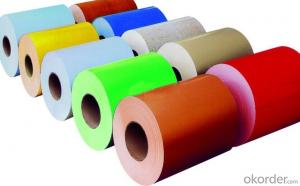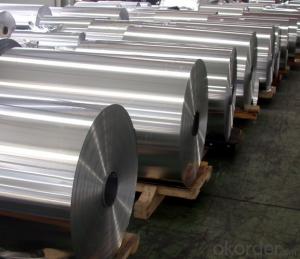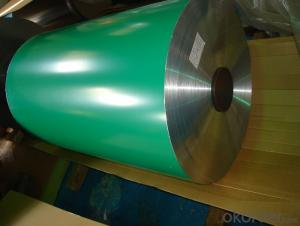Aluminum Coil Amerimax Upc 049821691820 PE and PVDF Color Coating Aluminum Coil Professional Manufacturer
- Loading Port:
- Shanghai
- Payment Terms:
- TT OR LC
- Min Order Qty:
- 5 m.t.
- Supply Capability:
- 10000 m.t./month
OKorder Service Pledge
OKorder Financial Service
You Might Also Like
Specification
1. Specification of PE and PVDF Color Coating Aluminum Coil Professional Manufacturer
characteristics | Application |
1) Super peeling strength | 1) Building exterior curtain walls |
2) Excellent surface flatness and smoothness | 2) Decoration and renovation additions for old buildings |
3) Superior weather, corrosion, pollutant resistance | 3) Decoration of interior walls, ceilings, bathrooms, kitchens and balconies |
4) Even coating, various colors | 4) Shop door decorations |
5) Fireproof, excellent heat and sound insulation | 5) Advertisement board display platforms and signboards |
6) Superior impact resistance | 6) Wallboards and ceilings for tunnels |
7) Lightweight and easy to process | 7) Industrial materials, materials for vehicles and boats |
2. Application of PE and PVDF Color Coating Aluminum Coil Professional Manufacturer
(1).Interior: wall cladding, ceilings, bathrooms, kitchens and balconies, shutters, doors...
(2).Exterior: wall cladding, facades, roofing, canopies, tunnels,column covers , renovations...
(3).Advertisement: display platforms, signboards, fascia, shop fronts...
3. Feature of PE and PVDF Color Coating Aluminum Coil Professional Manufacturer
*Such coil is specially designed to replace aluminum ingot, due to the high export tax of aluminum ingot, the coil has better price than ingot.
*This type of coil can fit customer's remelting furnace just like ingot, no need to make any change to the production line that was previously used for ingot. The standard coil size and weight is very suitable for the feed gate of furnace.
*This type of coil causes less material wastage than ingot when remelted.
*Our coil is made directly from ore, no need to go though the ingot making process, quality is much better than other suppliers who use ingot scrap to make coil.
Be free from Oil Stain, Dent, Inclusion, Scratches, Stain, Oxide Dicoloration, Breaks, Corrosion, Roll Marks, Dirt Streaks and other defect which will interfere with use
4. Certificate:
SGS and ROHS(if client request, paid by client), MTC(plant provided), Certificate of Origin(FORM A, FORM E, CO), Bureau Veritas and SGS (if client request, paid by client), CIQS certificate
5. Image of PE and PVDF Color Coating Aluminum Coil Professional Manufacturer
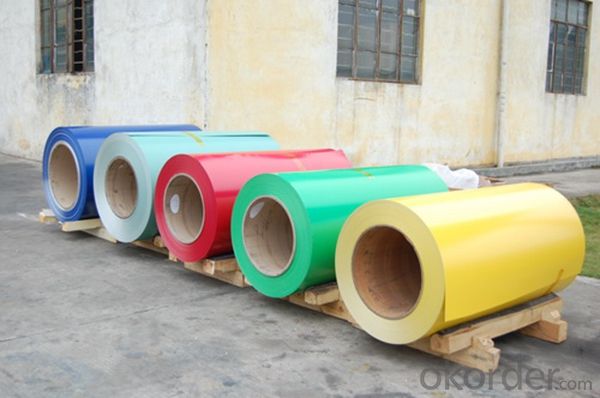
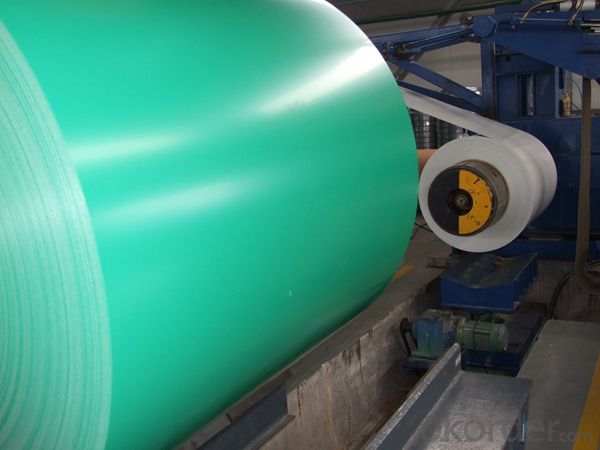
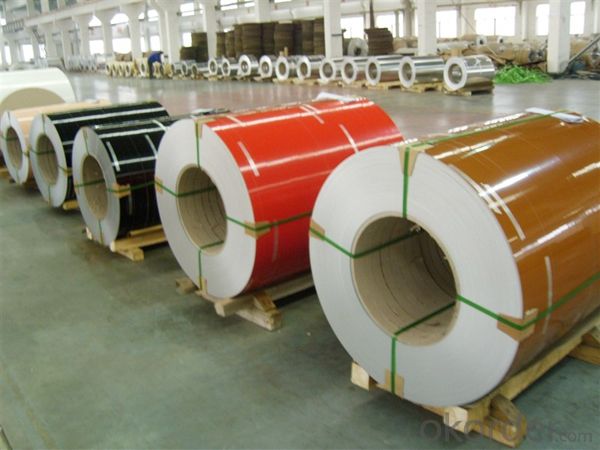
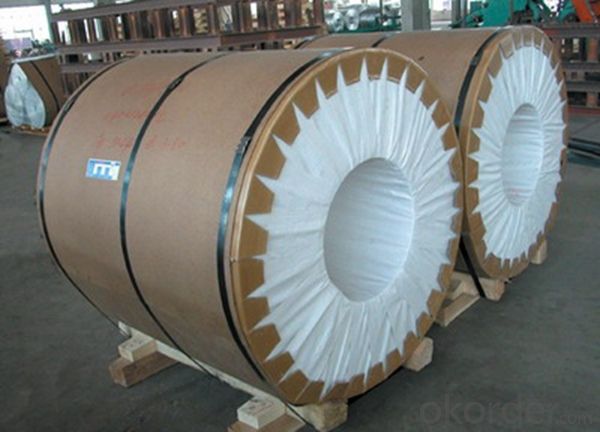
6. Package and shipping of PE and PVDF Color Coating Aluminum Coil Professional Manufacturer
eye to wall
eye to the wall
with wood pallet (wooded case also available)
7. FAQ
1) What is the delivery time?
Dpends on actual order, around 20 to 35 days
2)What is the QC system:
We have QC staff of 20 persons and advanced equipment, each production is with MTC traced from Aluminum ingot lot.
3) What market do you mainly sell to?
Australia, America, Asia, Middle East, Western Europe, Africa etc
- Q:How do I write ionic formula for Sodium Aluminum Silicate? Please explain in a easy way ,,,,,,,,,,,,
- There are literally thousands of different kinds of sodium aluminum silicate, and they do not have simple formulas, because the aluminum and silicon form giant oxygen bridged anions. Most clay minerals are of this type, more or less, although potassium is more common in clays than sodium. So there is no easy way. The empirical formula is sometimes written as a ratio of Na2O to Al2O3 to SiO2, but this gives no information about the structure, only the overall composition. Look up clay minerals online. Wikipedia might be a good start. Also the website mentioned in the other answer.
- Q:How do aluminum coils contribute to the fire resistance of products?
- Aluminum coils contribute to the fire resistance of products in several ways. Firstly, aluminum has a high melting point, which means that it can withstand high temperatures before it starts to deform or melt. This property is crucial in preventing the spread of fire as it helps to maintain the structural integrity of the product, limiting the fire's ability to penetrate or weaken it. Additionally, aluminum has excellent thermal conductivity, meaning it can efficiently dissipate heat. This characteristic plays a crucial role in fire resistance as it helps to cool down the surrounding area, minimizing the risk of ignition or combustion of nearby materials. By quickly transferring heat away from the source, aluminum coils can prevent the fire from spreading or escalating. Moreover, aluminum is non-combustible, which means it does not burn or support combustion. This property is vital in fire resistance as it prevents the aluminum coils from adding fuel to the fire. Instead, aluminum acts as a barrier, preventing the flames from reaching other flammable materials and reducing the overall fire hazard. Furthermore, aluminum is resistant to corrosion, which enables the coils to maintain their structural integrity over time, even in high humidity or corrosive environments. This durability is crucial as it ensures that the fire resistance properties of products remain intact, providing long-lasting protection against fire hazards. Overall, aluminum coils contribute to the fire resistance of products through their high melting point, excellent thermal conductivity, non-combustible nature, and resistance to corrosion. These properties work together to limit the spread of fire, dissipate heat efficiently, prevent the addition of fuel to the fire, and maintain the structural integrity of the product, ultimately enhancing its fire resistance capabilities.
- Q:Can aluminum coils be used for heat dissipation purposes?
- Yes, aluminum coils can be effectively used for heat dissipation purposes. Aluminum is an excellent conductor of heat, with high thermal conductivity and low thermal resistance. This makes it an ideal material for transferring heat away from a source and dissipating it into the surrounding environment. Aluminum coils are commonly used in various applications such as refrigeration, air conditioning, radiator systems, and heat exchangers. The coils are designed to maximize the surface area available for heat transfer, allowing for efficient cooling and dissipation of heat. Additionally, aluminum is lightweight and corrosion-resistant, making it a practical choice for heat dissipation in various industries. Overall, aluminum coils are a reliable and efficient solution for heat dissipation purposes.
- Q:How are aluminum coils stored to prevent damage?
- To prevent damage, aluminum coils are typically kept in a controlled environment. The storage area must be clean, dry, and well-ventilated to prevent moisture buildup that can cause corrosion. It is common to stack the coils on pallets or racks, keeping them off the ground and protecting them from dirt, dust, or water. It is important to ensure that the storage area is free of sharp objects or heavy items that could potentially dent or scratch the coils. Additionally, it is crucial to store the coils in a way that prevents them from shifting or falling, as this could cause deformation or other damage. Proper labeling and organization of the coils are also necessary for easy identification and access without causing harm. Paying careful attention to storage conditions and handling practices is essential in maintaining the integrity and quality of aluminum coils and preventing potential damage.
- Q:Can aluminum coils be used in the production of aluminum curtain walls?
- Yes, aluminum coils can be used in the production of aluminum curtain walls. Aluminum coils are typically used as the raw material in the manufacturing process of aluminum curtain walls. These coils undergo various processes, such as rolling, cutting, and shaping, to create the desired components of the curtain wall system. The lightweight and corrosion-resistant properties of aluminum make it an ideal material for curtain walls, as it provides structural stability, durability, and aesthetic appeal to the building façade. Overall, aluminum coils play a crucial role in the production of aluminum curtain walls, ensuring the quality and performance of the final product.
- Q:like we have seen a disk of aluminum spinning, and a permanent magnet repell the plate because apparently because of temporary hystersis and because the north or south field causes the same in the aluminum, so why wont a plate of ruby do the same thing? Are not all metals, crystals? Perhaps its just too big and difficult a question for you simple huumans,..eh?
- Hey, magnets work on iron and steel, but not on non-ferrous metals.
- Q:What are the common problems faced with aluminum coils?
- Some common problems faced with aluminum coils include corrosion, poor heat transfer, refrigerant leaks, and coil damage due to mechanical stress or improper maintenance.
- Q:What are the disadvantages of using aluminum coils?
- One of the disadvantages of using aluminum coils is their susceptibility to corrosion. Aluminum is a reactive metal and can easily oxidize when exposed to moisture and certain chemicals, leading to corrosion and degradation of the coils over time. Additionally, aluminum coils may be more expensive compared to other coil materials such as copper, which can impact the overall cost of HVAC systems or other applications that utilize coils.
- Q:Can aluminum coils be used in food packaging?
- Indeed, food packaging can make use of aluminum coils. Aluminum, a secure and adaptable substance, has enjoyed extensive usage in the food packaging sector for numerous years. It provides numerous advantages, including its lightweight nature, resistance to corrosion, and exceptional thermal conductivity. These qualities render it perfect for food packaging scenarios that prioritize the maintenance of food product quality, freshness, and safety. Aluminum coils can be conveniently molded into various shapes and dimensions, permitting tailored packaging solutions. Furthermore, aluminum qualifies as a sustainable material due to its 100% recyclability, further augmenting its allure for food packaging purposes.
- Q:How are aluminum coils used in the electrical industry?
- Aluminum coils are widely used in the electrical industry for various applications such as transformers, motors, generators, and electrical transmission systems. These coils are used to create electromagnetic fields, which are essential for the functioning of these electrical devices. Additionally, aluminum coils are preferred due to their lightweight, high thermal conductivity, and cost-effectiveness compared to other materials.
1. Manufacturer Overview |
|
|---|---|
| Location | |
| Year Established | |
| Annual Output Value | |
| Main Markets | |
| Company Certifications | |
2. Manufacturer Certificates |
|
|---|---|
| a) Certification Name | |
| Range | |
| Reference | |
| Validity Period | |
3. Manufacturer Capability |
|
|---|---|
| a)Trade Capacity | |
| Nearest Port | |
| Export Percentage | |
| No.of Employees in Trade Department | |
| Language Spoken: | |
| b)Factory Information | |
| Factory Size: | |
| No. of Production Lines | |
| Contract Manufacturing | |
| Product Price Range | |
Send your message to us
Aluminum Coil Amerimax Upc 049821691820 PE and PVDF Color Coating Aluminum Coil Professional Manufacturer
- Loading Port:
- Shanghai
- Payment Terms:
- TT OR LC
- Min Order Qty:
- 5 m.t.
- Supply Capability:
- 10000 m.t./month
OKorder Service Pledge
OKorder Financial Service
Similar products
Hot products
Hot Searches
Related keywords
